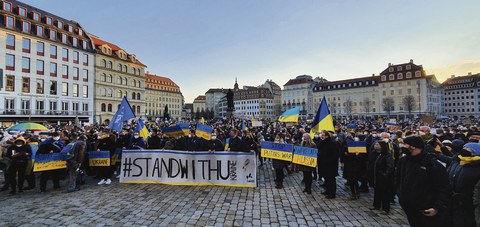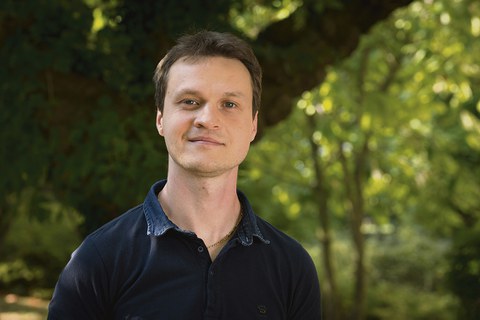Mar 15, 2022
Did Germany turn a blind eye to the developments in Russia?

On February 27, a few days after the invasion of Ukraine, thousands of people, including members of TUD, gathered for a large demonstration in Dresden.
Questions for a TUD expert: Historian Dr. Matthäus Wehowski spoke to us about the historical background to the war in Ukraine
UJ spoke with Dr. Matthäus Wehowski, an academic researcher at TUD’s Hannah Arendt Institute for Totalitarianism Studies (HAIT), about Russia’s invasion of Ukraine.
UJ: You studied History, Modern and Contemporary History as well as Slavonic Studies and have a doctorate in History. As a historian, how would you evaluate Russia’s war against Ukraine?
Dr. Matthäus Wehowski: As a historian specializing in Eastern Central Europe, you get used to studying war and violence, unfortunately. The American historian Timothy Snyder dubbed the region between Berlin and Moscow the “bloodlands” of the 20th Century, since brutal war and genocide were recurrent there. Some experts were afraid that a war of this type could break out once again in the 21st Century, but hardly anyone thought it was conceivable on this scale. Besides the Russian army’s invasion of Ukraine, it seems there is also a war between epochs taking place. Russian propaganda follows a pattern we considered relics of a bygone era: The idea of a nationalist and imperialist ‘Greater Russia’. Putin’s propaganda machine also relies on a skewed perception of the Second World War. The narrative is that the ‘fascist enemies’ are once again gathering their forces and threatening Russia’s existence. Putin sees himself as the "chief historian" of his country. During the summer of 2021, he already justified today’s invasion with a historical essay in which he denied Ukraine any independent history and culture.

Dr. Matthäus Wehowski.
To what extent is the Soviet past implicit in this war? In other words, is the former totalitarian regime the historical root, which did after all sign and ratify the Helsinki Accords, various disarmament treaties, etc.?
The relationship between the Soviet party leadership in Moscow and Ukraine always veered between periods of temporary tolerance and brutal repression. Lenin knew it would be difficult to integrate Ukraine into the Soviet Union’s political system after the revolution and civil war. So, beginning in the 1920s, he introduced the policy of korenization (Korenizatsiya / коренизация) to spread the communist ideology with the help of the Ukrainian elites. In return, he was also prepared to make (tactical) concessions to the Ukrainian national movement. When Stalin took over power and established his cult of personality after 1929, the Great Purge began in all sectors of Soviet society. Stalin took brutal and arbitrary action against anyone he considered an enemy. Ukraine was hit especially hard, as Stalin wanted to transform it into a ‘model republic’ of the Soviet Union. The consequences of forced industrialization and the forced collectivization of agriculture was a man-made famine that killed approximately four million people. Victims of Stalin’s violent policies included Ukrainian intellectuals who championed the independence of Ukrainian culture. Stalin justified this persecution as a struggle against ‘Ukrainian fascism’ – we should be very concerned that this term is now being used again. Many Ukrainians are afraid of (renewed) targeted destruction of their culture. After the Second World War and Stalin’s death in 1953, the mass arrests and murders stopped. However, Ukrainian intellectuals still faced persecution. Ukraine was always ambivalent about its status as a republic of the Soviet Union. On the one hand, it was an integral part of the Soviet Union, but it also had its own seat in the United Nations (it was even one of its founding members). However, the seat of power always remained de facto in the Kremlin. A slow process of political transformation began after independence in 1991, to which the majority Russian-speaking areas – even Crimea (albeit narrowly) – agreed to. However, this was also accompanied by many setbacks and ultimately led to tremendous frustration among the population, which erupted in November 2013. The goal of the Ukrainian people was not to belong to any geopolitical power blocs, but to end post-Soviet stagnation.
Shouldn’t Russia’s annexation of Crimea in 2014, which had been in the offing for a long time, have been a warning signal for Europe?
The warning signals were there much before then. In 2005, Putin already spoke about the dissolution of the Soviet Union and the resulting independence of Ukraine as “the biggest geopolitical catastrophe of the twentieth century”. He has often repeated this since then and allusions to Russia's historical greatness was one of his most important instruments of power. Year before, the historian Karl Schlögel had already warned about “Russian kitsch" in Germany that completely ignores Putin's dangerous rhetoric or plays it down as folklore. Even the growing repression within its borders and the Russian government’s increasingly aggressive foreign policy (Chechnya 1999, Georgia 2008, Crimea 2014, Syria 2015) did little to change this. We need to ask ourselves today whether people in Germany turned a blind eye to many of the developments in Russian politics (also for economic reasons). Everyone, knew the extreme language used against "the West" was intensifying. For example,this was clear to anyone who followed Russian state television closely in recent times. Russian propaganda completely denied the political and cultural independence of the Ukrainian people. And also ignored the fact that, despite all the political problems, there was a peaceful and democratic government and parliamentary transition of power. After the 2019 parliamentary election, only one of the 450 members of the Ukrainian parliament (previously there were seven) belonged to the far-right party Svoboda, and the notorious Right Sector failed to clear the five-percent hurdle. Regardless, the Russian media continued to speak of a "fascist coup,". This idea was even repeatedly picked up on in Germany and propagated by the extreme political fringes.
You’re in touch with Ukrainian and Russian academics. How are you keeping in touch with them and what is their state of mind at the moment?
Internet and phone signal to Ukraine still work normally without any problems (editor’s note: as of March 9, 2022.). The German historical and Slavonic institutes are very well connected to their colleagues. Most are outraged and shaken by the sudden and dramatic escalation of the war. Although many expected an expansion of the military conflict, they are shocked by its extent and intensity. Nevertheless, the degree of normality with which life continues is astonishing. Many organizations, including universities, continue to work. I even listened in on an academic conference at the Kyiv School of Economics as recently as February 28. Between the sirens signaling incoming bombs and acquisition of food, researchers and students continue to make sociological surveys of the population or create databases to document the war damage. People are trying to continue living a normal life, insofar as this is possible. The war is seen as unjust and completely unnecessary. The very idea that open-minded, multicultural (including Russian culture) and modern cities like Kiev, Lviv or Kharkiv (which is predominantly Russian-speaking) should be ruled by "Neo-Nazis" or "fascists" is absurd.
You were born in Poland and Ukraine is a neighboring country of Poland. What are your personal feelings on this war?
Yes, and I also have a lot of relatives in East Poland, some even live on the Ukrainian border. We are deeply troubled and for my grandfather, who witnessed the German invasion as a child, all these memories are being stirred up again. Poland started preparing to receive Ukrainian refugees weeks ago and some of my family members are also helping. There has been a huge wave of solidarity. It must also be said that approximately two million Ukrainians already live in Poland, many of whom fled the war in the Donbass that has been going on since 2014. However, my current feelings have less to do with my Polish heritage and more to do with my research. Unfortunately, we have to watch as decades of scientific, cultural and societal work both in Ukraine and in Russia could be destroyed in just a few days.
Dr. Matthäus Wehowski, interviewed by Karsten Eckold
This article was published in issue 5/2022 of the Universitätsjournal on March 15, 2022. The full issue can is available on the UJ website at https://tu-dresden.de/uj and can be downloaded as a PDF for free. The Universitätsjournal can be ordered in print or as a PDF from
